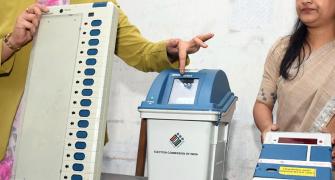The study titled 'A National Energy Map for India: Technology Vision 2030' by The Energy Research Institute estimates alternative trajectories of energy requirements and examines the likely fuel mix for the country under various resource and technological constraints during 2001-31.
It said pressure on the three conventional energy forms - coal, oil and gas - will continue to remain high in India in the next few decades even if the contribution of hydro, nuclear, and renewable energy increases significantly.
Although the contribution of hydro, nuclear and renewable energy forms together may increase by about six times in the next three decades, these sources can at most contribute to a mere 4.5 per cent of the total energy requirements, it said.
From the viewpoint of energy security and the need to reduce its dependence on imports of energy fuels, the country needs to undertake all possible options on the demand and supply side, which have implications on energy security as well as foreign exchange outflows, the study said.
It said India's high dependence on oil import indicated the economy's vulnerability to oil supply disruptions emanating from external factors such as wars and political instability and adverse impacts of sudden oil prices.
With the likely growth in energy demands, it is clear that the maximum annual production potential of all the conventional energy forms will be fully exploited by 2016 and the country would need to increase its imports of coal, oil, and gas in the future, it said.
The study assesses three economic scenarios - low growth (6.7 per cent), business as usual (BAU, 8 per cent), and high growth (10 per cent) - and looks at the scope for greater use of renewable energy, nuclear power and greater energy efficiency measures across all sectors.
In the front of BAU, the total commercial energy consumption is estimated to increase by 7.5 times over the next 30-year period from a level of 285 Mtoe (million tonnes of oil equivalent) in 2001 to 2123 Mtoe in 2031.
A comparison of energy requirements across the alternative economic growth scenarios indicates that if the economy grows at a slower pace of 6.7 per cent, commercial energy requirement would increase to only about 1579 Mtoe by 2031 (5.9 per cent GDP growth), while the energy requirements could be as high as 3351 Mtoe (8.6 per cent GDP growth) by 2031 with a growth rate of 10 per cent.
The study was commissioned by the office of the Principal Scientific Advisor to the Government of India.
It said coal would continue to play a key role in meeting the country's energy requirements but the indigenous availability of coal is expected to plateau in the next couple of decades with the current exploitation plans and technology.
With coal demand expected to increase in the Asian market, prices of coal may also increase rapidly, exerting greater pressure on the economy.
Therefore, it is extremely important to reduce the import dependency of coal by gearing up exploration and production activities including undertaking joint ventures for extraction of coal from seams that are over 300-m deep, it said.
Outlining various options of energy resources before the country, the report said gas is a preferred option for power generation as well as fertilizer production.
However, while the domestic availability of natural gas is estimated to plateau at about 44 Mtoe by 2012, imports of gas are fraught with uncertainty.
The report said in order to minimize the levels of import dependency, India should focus on increasing the supply of indigenous energy resources and plan to enhance efforts in R&D in the exploration and production of energy resources especially in the area of deep-sea natural gas exploration.
Since the transport sector accounts 70 per cent of the total petroleum consumption, it is also the most crucial sector in terms of requiring action for improving efficiency.
The steps for reducing the consumption of petroleum products and thereby their import dependency suggested by the report include enhancing the share of public transportation, promoting Mass Rapid Transit System, ensuring better connectivity of trains to urban areas of the cities and so on.
It also suggested for introduction of alternative fuels such as Compressed Natural Gas, bio-diesel, electrification of the railway tracks and introducing Bharat-III norms across the country for road-based personal vehicles.
Identifying lighting as the major electricity-consuming end-use in the residential sector, it said the replacement of light bulbs with tube lights and CFLs (compact fluorescent lamps) can bring about huge energy savings.
Towards this end, the cost of CFLs needs to be reduced by promoting their large-scale manufacturing, it said.
Calling for rationalizing agricultural power tariffs, the report said power tariffs for the agricultural sector should be at least at a level where the cost of generation can be recovered.







